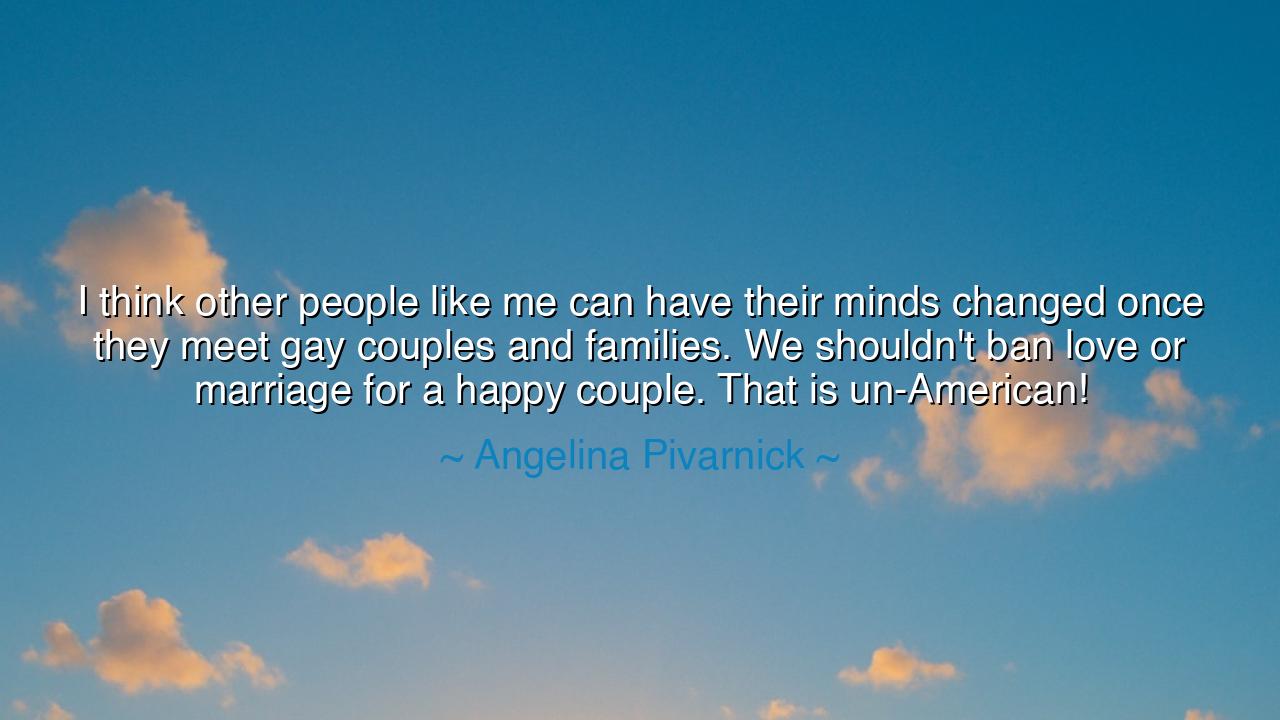
I think other people like me can have their minds changed once
I think other people like me can have their minds changed once they meet gay couples and families. We shouldn't ban love or marriage for a happy couple. That is un-American!






Hear, O seekers of understanding, the words of Angelina Pivarnick, who spoke with humility and awakening when she declared: “I think other people like me can have their minds changed once they meet gay couples and families. We shouldn’t ban love or marriage for a happy couple. That is un-American!” Though she came not as a philosopher nor a politician, her words carry the rare beauty of transformation — the moment when the heart opens and truth shines in. For it is one thing to be born wise, but another, and perhaps greater thing, to be changed by love.
This quote is born from the age-old struggle between prejudice and understanding, between fear and compassion. Angelina, like many before her, once lived in a world framed by misunderstanding — a world that taught suspicion instead of empathy, division instead of unity. But upon meeting those whom society had labeled “other,” her heart began to see beyond those boundaries. She saw love not as theory, but as living truth — in the way two people care for one another, build homes together, raise children, and nurture joy. From that encounter came revelation: that love itself is the highest law, and to deny it to anyone is to deny our shared humanity.
The ancients would have called this the awakening of the soul — the moment when ignorance falls away like scales from the eyes. For understanding begins not with argument, but with encounter. No decree, no book, no law can change the heart as powerfully as meeting another human being face to face, hearing their laughter, their pain, their hope. This is what Angelina discovered: that the bridge between hearts is built not by debate but by compassion. Her cry, “We shouldn’t ban love,” echoes through the corridors of time like a plea from the prophets of old, who urged kings and people alike to remember mercy above custom.
Consider, my children, the tale of Mildred and Richard Loving, the couple whose very name seemed chosen by destiny. In 1958, they were arrested in Virginia simply for being married — she Black, he white — for the laws of their state forbade their union. They were exiled from their home until, through years of courage and quiet endurance, they won their case before the Supreme Court in 1967. Their victory did not just legalize their love; it illuminated the truth that love transcends the constructs of men. Decades later, the same spirit would guide the struggle for marriage equality, for every couple, regardless of gender, to stand equal before the law. Angelina’s words walk in that same lineage — a continuation of love’s eternal defense against fear.
When she declares that denying marriage is “un-American,” she speaks not only as a citizen but as a witness to freedom’s true meaning. For what is freedom if not the right to love openly, to form family, to build one’s life in peace? The founders of great nations spoke of liberty and happiness as unalienable rights, but they could not foresee every frontier of justice. It is left to each generation to expand those ideals, to extend their promise. Equality, like love, is a living thing — it must be tended, renewed, and defended in every age.
There is a lesson here, one both timeless and tender: hearts can change. What was once unfamiliar can become beloved when touched by empathy. Let no one believe that those who differ are beyond understanding, nor that one’s opinions are stone. The heart is a living flame — and when it encounters truth, it can be reshaped, refined, and reignited. Angelina’s transformation reminds us that to meet another with openness is the beginning of wisdom, and to stand for another’s love is the beginning of justice.
Therefore, my listeners, take this teaching to heart: do not fear what you do not yet understand. Seek out those whose lives are unlike your own. Listen to their stories; walk beside them in their joys and their sorrows. For in doing so, you will find not strangers, but mirrors — reflections of the same humanity that beats within you. If ever you are tempted to judge, remember: every love story, no matter its form, is a thread in the great tapestry of life, woven by the same divine hand.
And so, let these words of Angelina Pivarnick be a call to all: to defend love, to open the gates of the heart, and to remember that the measure of a people lies not in whom they exclude, but in whom they embrace. For as long as love is honored, humanity endures. And when the day comes when every couple may love freely beneath the same sky, then — and only then — will we truly be equal, and truly free.






AAdministratorAdministrator
Welcome, honored guests. Please leave a comment, we will respond soon